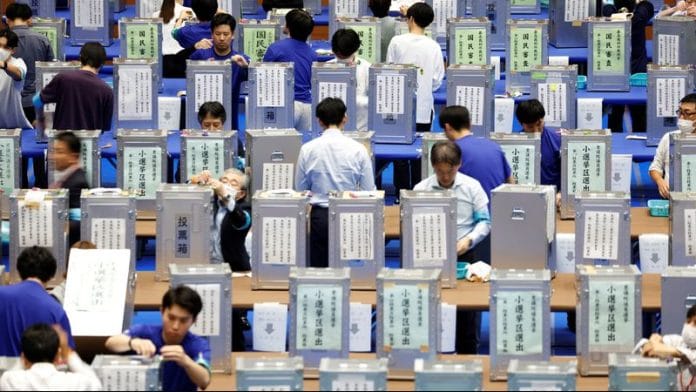Tokyo: Japan’s ruling coalition is set to lose its parliamentary majority, exit polls for Sunday’s general election suggested, raising uncertainty over the make-up of the government of the world’s fourth-largest economy.
A poll by public broadcaster NHK showed Prime Minister Shigeru Ishiba’s Liberal Democratic Party (LDP), which has ruled Japan for almost all of its post-war history, and junior coalition partner Komeito were set to win between 174 and 254 of the 465 seats in the lower house of Japan’s parliament.
The main opposition Constitutional Democratic Party of Japan (CDPJ) was predicted to win 128 to 191 seats.
The outcome may force parties into fractious power-sharing deals to rule, potentially ushering in political instability as the country faces economic headwinds and an increasingly tense security environment in East Asia.
The election comes nine days before voters in the United States – Japan’s closest ally – head to the polls in another unpredictable election.
A poll by Nippon TV showed Japan’s ruling coalition would win 198 seats to the CDPJ’s 157, both well short of the 233 seats for a majority, as voters punished Ishiba’s party over a funding scandal and inflation.
“I think these results are the outcome of an unsparing verdict on the LDP… coming from various factors, including how we have not been able to settle the issue of political money issue,” Shinjiro Koizumi, the LDP’s election chief, told NHK.
Ishiba called the snap poll immediately after being elected to head the party last month, hoping to win a public mandate for his premiership. His predecessor Fumio Kishida quit after his support cratered due to anger over a cost of living crunch and a scandal involving unrecorded donations to lawmakers.
The LDP has held an outright majority since it returned to power in 2012 after a brief spell of opposition rule. It also lost power briefly in 1993, when a coalition of seven opposition parties formed a government that lasted less than a year.
POLITICAL DEALS
The polls suggest smaller parties, such as the Democratic Party for the People (DPP) or the Japan Innovation Party, could prove key to forming a government.
The DPP is expected to win 20 to 33 seats and the Japan Innovation Party 28 to 45 seats, according to NHK’s exit poll. But both propose policies at odds with the LDP line.
DPP party chief Yuichiro Tamaki has so far rejected the idea of working with an LDP-led coalition. Innovation Party head Nobuyuki Baba has not ruled out a partnership.
The DPP calls for halving Japan’s 10% sales tax until real wages rise, a policy not endorsed by the LDP, while the Innovation Party has pledged tougher donation rules to clean up politics.
“The DPP is focussed on ultimately making the country better and ensuring financial resources are allocated more appropriately, so that’s why I decided to vote for them,” Keisuke Yoshitomi, a 39-year-old office worker, said after casting his vote at a polling station in Tokyo.
The Innovation Party opposes further increases in interest rates, and the DPP leader has said the Bank of Japan may have been hasty in raising rates, while the central bank wants to gradually wean the Japan off decades of massive monetary stimulus.
Political wrangling could roil markets and be a headache for the Bank of Japan if Ishiba chooses a partner that favours maintaining near-zero interest rates when the central bank wants to gradually raise them.
Japanese shares fell 2.7% last week on the benchmark Nikkei index after opinion polls first indicated the ruling coalition could lose its majority.
“With a more fluid political landscape, pushing through economic policies that include raising taxes, such as to fund defence spending, will become much harder,” Masafumi Fujihara, associate professor of politics at Yamanashi University.
“Without a strong government, it would be more difficult for the BOJ to raise rates and keep the weak yen under control.”
(Reporting by Sakura Murakami, Tim Kelly, John Geddie, Chang-Ran Kim, Kantaro Komiya, Yoshifumi Takemoto; Editing by William Mallard)
Disclaimer: This report is auto generated from the Reuters news service. ThePrint holds no responsibilty for its content.






